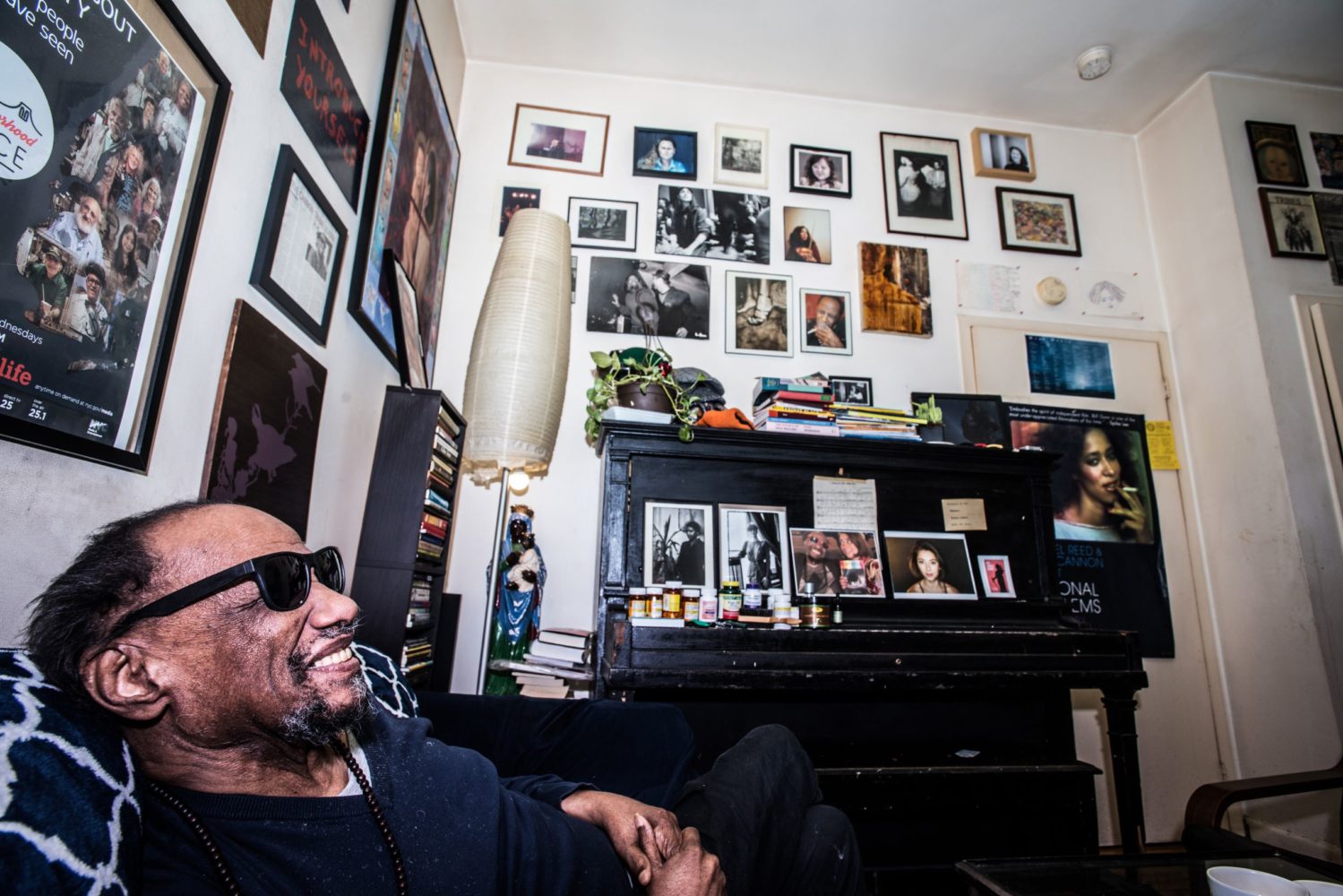Lost Lit
Black and Blue
Between the covers with Steve Cannon
Published: May 31, 2019
Last Updated: August 30, 2019

Photo by Tracie Williams
Steve Cannon—playwright, writer, mentor, poet, and retired professor—tells stories of old while surrounded by ephemera gathered over almost three decades of running A Gathering of the Tribes.
Right smack in my pubescent phase, well before the internet’s fleshier underbelly would become fully apparent, I’d sneak into my middle school library to rendezvous with a handful of classmates between the stacks. There, we’d listen to our friend, whom I’ll call J—, read from our library’s small collection of Anne Rice titles. J— had memorized, in chapter and verse, the location of all the best dirty parts from Rice’s obscene oeuvre. Tales of amorous vampires, Venetian castrati, and, most provocative of all, a sex-starved Sleeping Beauty.
But no amount of risqué Rice material could have prepared me for Steve Cannon’s Groove, Bang and Jive Around.
To be absolutely clear—before you decide to hunt down a copy—Cannon’s first and only published novel is smut. Fifty million shades of smut. Lock-the-doors-and-don’t-answer-the-phone-can-I-be-arrested-for-reading-this smut. Smut of questionable literary value, yes. But certainly smut of cultural import. “That dirty, filthy book,” Cannon called the novel in a 2010 interview. “My oldest sister read that book and she couldn’t sit down for a week,” he laughed. “She had to read that book standing up.”
Interpret those words as you will.
Cannon grew up in New Orleans’s Twelfth Ward, the thirteenth child born to a Baptist preacher from Plaquemines Parish; future jazz legend Ellis Marsalis was a boyhood friend. He abandoned the city in 1952, before he turned eighteen, having decided that New Orleans was no place for a young black man with a head brimming with artistic aspirations. For the next decade he rambled the world, finally settling in Manhattan’s East Village, where he still resides.
In New York, Cannon cofounded the Umbra Workshop arts collective alongside a cadre of black writers and intellectuals, including Ishmael Reed, saxophonist Archie Shepp, and New Orleanian Tom Dent. He dropped Groove in 1969 with Olympia Press, Maurice Girodias’s iconoclastic publishing house that specialized in censored, banned, and litigated works like William S. Burroughs’s Naked Lunch, the first English-language edition of Anne Desclos’s Story of O, Henry Miller’s Sexus/Nexus/Plexus trilogy, and, most famously, Vladimir Nabokov’s Lolita.
Girodias liked to say that “a four-letter word never killed a reader,” but Groove, Bang and Jive Around might someday prove otherwise. Cannon’s novel chronicles the carnal escapades of Annette, a teenage temptress from New Orleans’s Gert Town neighborhood. Cannon introduces her plonking two bits into the jukebox at a dive bar called the Gumbo House. She punches J-10: the Temptations’s 1968 psychedelic soul smash “Cloud Nine,” a song that neatly parallels the author’s own upbringing.
The childhood part of my life wasn’t very pretty
You see, I was born and raised in the slums of the city…
Needed something to ease my troubled mind.
Annette eases her mind’s troubles with sex. Sex in the Gumbo House restroom with a hustler named Sleepy Willie. Sex with her sister’s boyfriend, Dip. Sex with women. Sex with various family members. Sex with a voodoo priestess named Marie. Sex with a white sleazebag known as the Right Reverend Max. Chapter by chapter, tongues, limbs, and genitalia pretzel themselves into more orgies than I care to count.
In these chaste pages in which I write, I cannot quote much from Cannon’s novel beyond his description of the weather, which still manages to sound salacious: “Clouds exploded in the vicinity, telegraphing streaks of bluewhiteyellowredpurple lightning, igniting power lines, sparking along rooftops and freaking off down the street.”
Halfway through, Annette hitches a ride on an airplane—yes, there’s a mile-high orgy, as if you needed to ask—to the Land of Oo-bla-dee, a mystical paradise for people of color founded by trumpeter Dizzy Gillespie. Cannon writes that there are “no cops, politicians or other lowly creatures” in Oo-bla-dee. Like Wakanda in Black Panther, Oo-bla-dee is an Afrofuturist utopia, a place where “black, tan, yellow and brown . . . people ran their own lives,” a Cloud Nine devoid of white sovereignty. In Oo-bla-dee—a land named in a composition by the black jazz pianist Mary Lou Williams and popularized by Gillespie in the late 1940s—white gentrifiers of black music, including Benny Goodman, Barbra Streisand, and Janis Joplin, are kidnapped and confined to a museum-prison. White supremacists like Lester Maddox, George Wallace, and Rhodesian prime minister Ian Smith are relegated to the zoo.
Cannon has said that he wrote his “pornographic protest” novel to talk about the “contradictions of American society and just have some fun.” It quickly became an underground classic, selling over 150,000 copies before disappearing completely, if the 1996 reprint edition is to be believed (I’m skeptical about those sales figures). Ishmael Reed called it a “pre-Rap novel.” Darius James, who wrote his own underground hit, Negrophobia, two decades later, wrote that up until its republication, Groove, Bang and Jive Around remained an urban myth among black cognoscenti: “You couldn’t find it. Not in used book stores. Not in book piles on the street. In fact, its author didn’t own a copy for well over twenty years. You can’t keep that book in your house, man! It’s like a ghost! It just disappears!”
A 2018 New York Times Magazine essay profiled Cannon’s post-Groove, but resolutely groovy, life; he went on to found a black avant-garde magazine-turned-art gallery and salon named A Gathering of the Tribes. “No figure in downtown Manhattan,” the article states, “has done more than Cannon and yet received less credit.”
Six decades ago, New Orleans’s loss became New York’s gain. But writing in one city about life in another, Cannon managed to craft one of American literature’s most titillating, revolting, and altogether odd novels. Groove, Bang and Jive Around is no urban myth. Read at your own risk.
Rien Fertel likes to read in bed, among other places.
